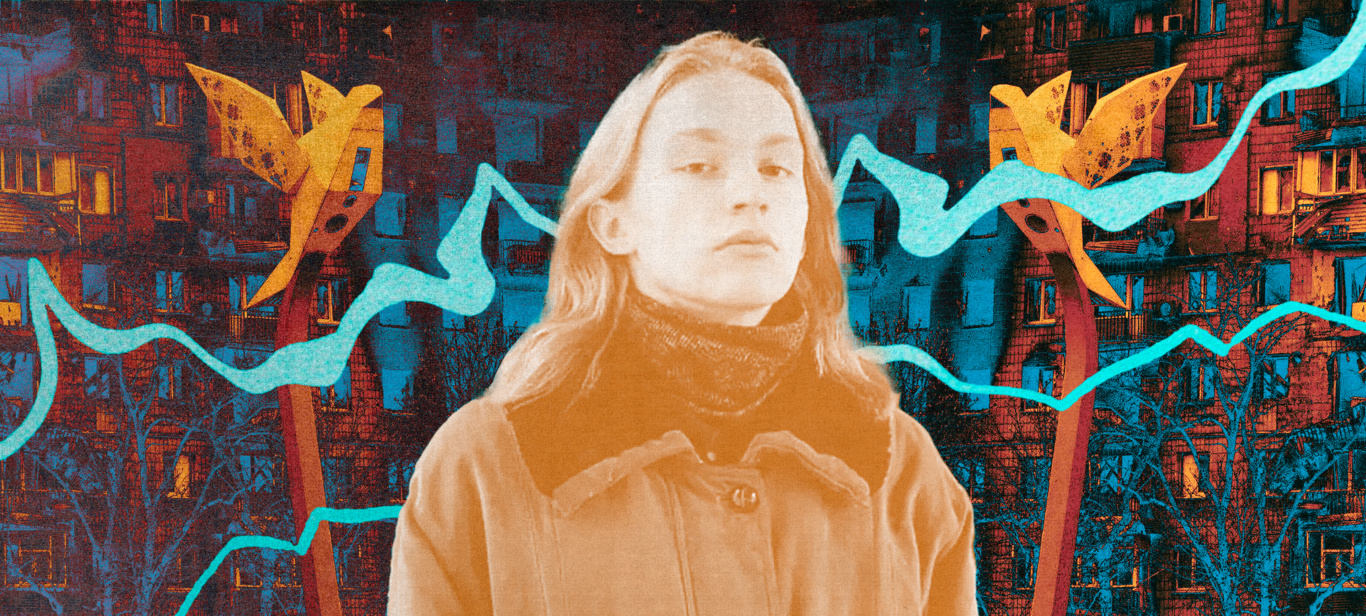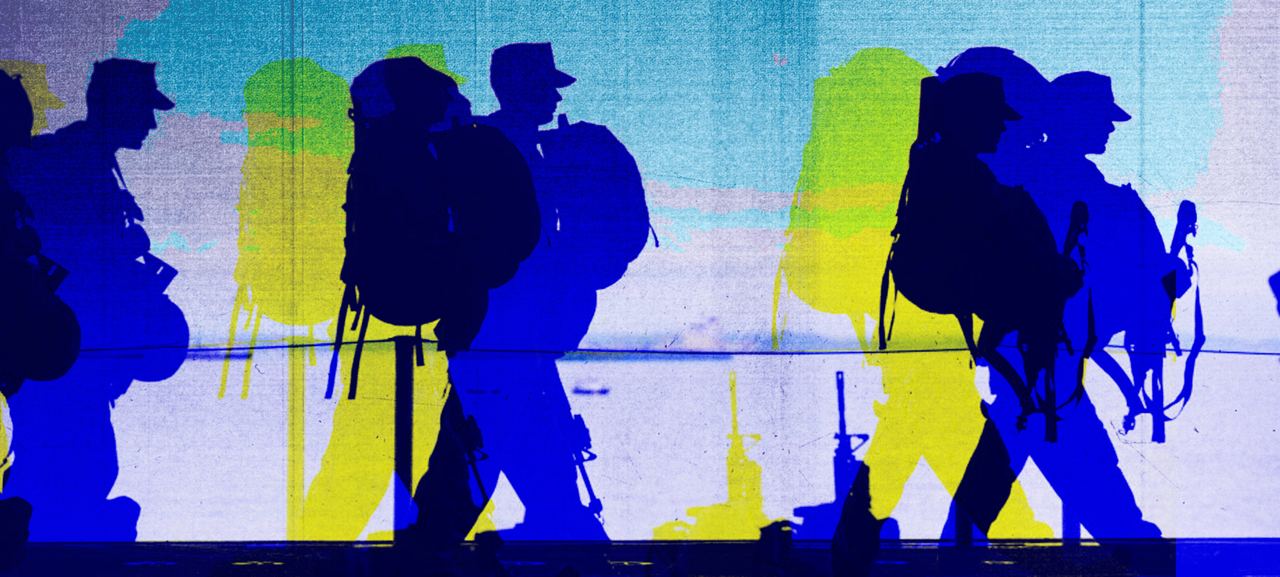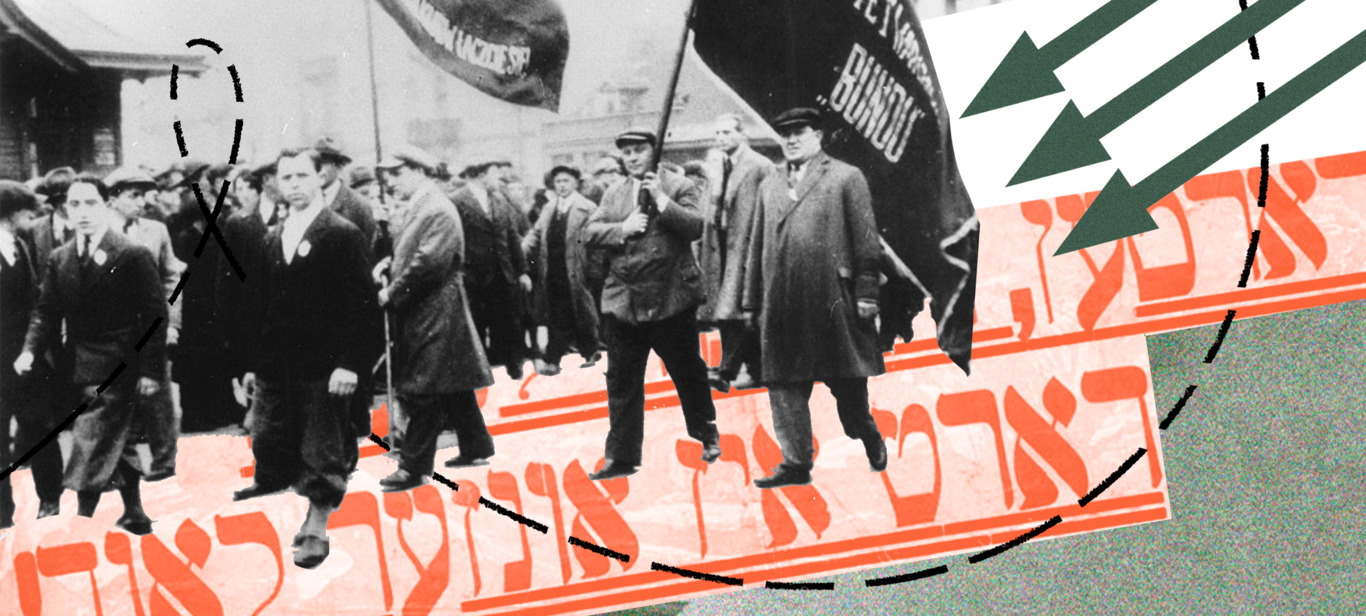On 17 March 2023, the International Criminal Court in The Hague issued warrants of arrest for russian*[1] president Vladimir Putin and children’s commissioner Maria Lvova-Belova for the mass abduction of Ukrainian children. The court's statement holds them accountable for the harm inflicted upon Ukrainian children due to the war crimes of forcibly displacing individuals from the occupied regions.
What follows is a conversation about one Ukrainian teenager’s experience of deportation, filtration, and subsequent detention in a russian orphanage. It is, most importantly, a conversation about successful resistance to the infrastructure for keeping deported minors in russia and forcibly integrating them into russian society.
The conversation took place between the collective TSVIRIN[2] and the musician Truffikss (David), who survived the experience first-hand. Ukrainian artist Maria Pronina, who has been volunteering to support and mentor a group of deported teenagers since 2022, also took part. Maria and her colleagues have established the "Ptichka" foundation, which aims to help teenagers who have survived deportation and to foster their creative development.
You are now in Kyiv. What are you doing and how do you feel? What are your impressions of Ukraine’s capital during the war?
D.: I’m engaged in my personal development, composing music and working on musical ideas, reading, and enjoying life. Since returning to Ukraine, I’ve recorded my third album, “Prey” ["Zdobych"]. I’m also dealing with the aftermath of having been deported [to russia] and having spent time in an orphanage there. You have to understand that you are not to blame for everything that happened to you but it's very difficult…
In an article about you in The Guardian, it was reported that you went to a demonstration in Mariupol and sang the Ukrainian national anthem there. Can you tell us more about it?
D.: Yes, it was a pro-Ukrainian rally: Mariupol made it clear that it wasn't waiting for russia. Ukrainian society gathered to express its position.
M.: The first rally took place on February 22 at the square [in front of the Mariupol Drama Theatre], where there were many people from the pro-Ukrainian community — there’s a video stream of it. But there was also a second time — I cried when I saw it. It was on February 27, at Freedom Square in Mariupol, where the doves are. You could already hear russia’s bombing of the city’s outer districts and David, with the Ukrainian flag draped across his shoulders, sang the national anthem.
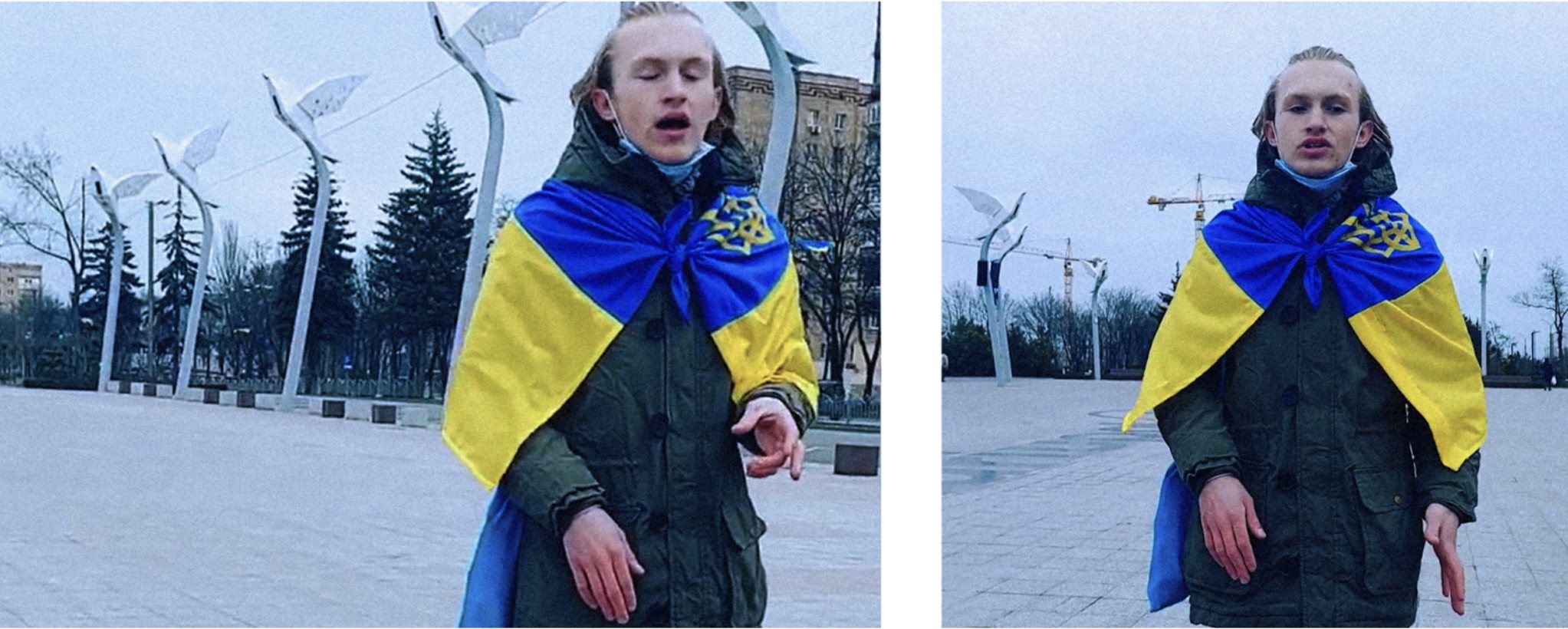
Screenshots from video, David sings the Ukrainian national anthem at Freedom Square in Mariupol, with the square’s distinctive dove-shaped street lights in the background
Could you tell us more about the atmosphere in the city, from the early days of the invasion until the moment you left?
D.: I don't really want to talk about it. Besides, every Mariupolian knows how it was, with buildings collapsing over your head, and so on. There were many times I could have died, for sure. I told my mother that I wanted to leave and she replied, "No, you're not going anywhere, I’ve decided." At that moment I realised that I was alone and that I had to leave the city on my own. I didn't know russian laws, so I assumed I’d be able to get out of there right away across the border to another country. But things went the way they did.
M: Yes, back then we also thought that we could quickly pick up all our teenagers who’d been moved to russia and get them out of there. But it turned out to be much more difficult.
I want to tell you more about David's creative work during that period. He didn't just sing the anthem. At some point he began making cool sarcastic videos where he was voguing in various places in Mariupol and singing in an electronic voice, "Putin's a dickhead!” [or lines from the national anthem of Ukraine]. I watched them when I was already in Lviv and thought: "Wow! Are those really our teenagers?" Back then, it wasn’t only David who was resisting in this way, there were other guys too. David is simply fearless — at the time, I was both shocked and desperate, elated and inspired, all at once.
Please tell us about the events between your decision to leave Mariupol and the moment you were brought to an orphanage in russia.
D.: I went down to a basement shelter (I was already without my mother back then), where they were feeding people twice a day. I felt terrible because the shelter workers were passing information about the location of Ukrainian troops on to the russians (the shelter was run by collaborators). But don’t think that all the people who had to spend time in that shelter were collaborators too — no, people were just trying to survive: some had found a way to leave Mariupol but many others could not. At one point, the russian soldiers arrived and said: "We're closing this shelter because it’s going to be used as headquarters for the Red Cross. You have several options: either stay in Mariupol but,” – and they said it with a smirk – “where exactly can you stay here? So, you can either go to Donetsk or russia”. And because I'm a minor, they told me that I had no other option but to go to russia.
I was like, "What?!"… I only had one night to pack, so I didn’t f*cking sleep at all. Excuse the language, I'm describing my emotions as best I can… I charged my phone using a generator and it was around 40 percent charged: I listened to music, wrote notes, deleted them. And I thought, "God, what am I going to do?" — I was so desperate. I remember writing notes, deleting them, writing again — deleting, writing — deleting… and I deleted all of them. Sadly. They were very important — I’d written some in Ukrainian and some in russian.
There was an atmosphere of panic and hysteria on the bus as we were driving. I was the only minor on board. Many people approached the russian collaborators, who told them a tale about the "fascists-Banderovites" — and they believed it. Those people who took what the russians said at face value are a lost generation. And it’s really scary.
This whole journey was really hard. We arrived in Donetsk and everyone around was saying: "Light! My god, light! Electricity!", and I was thinking: "OMG, they’ve made us euphoric about light. Why should we be grateful for something that, according to humanitarian law, should simply be an integral part of our lives?".
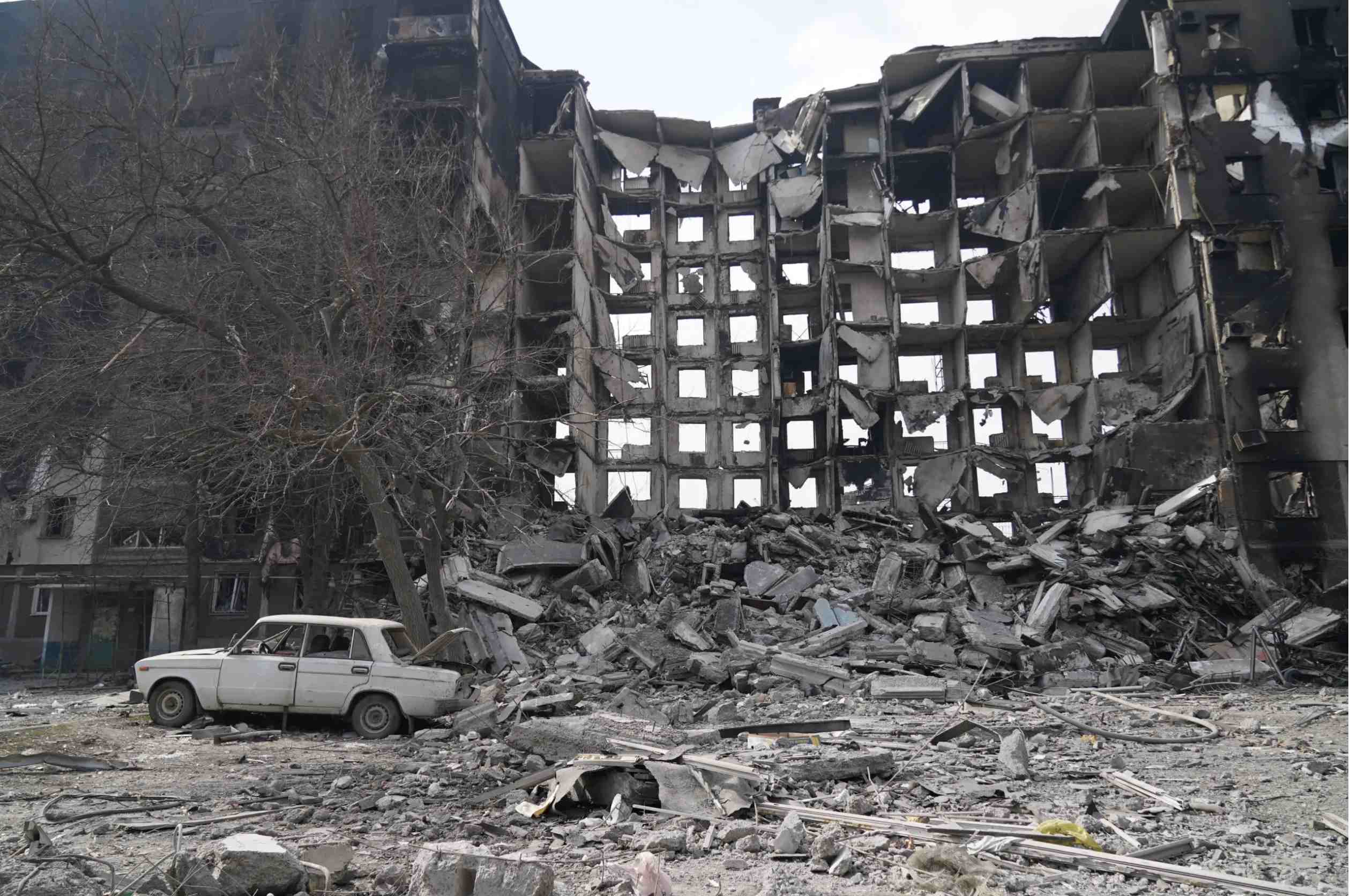
Mariupol, March 26, 2022. Photo: Stringer/Anadolu Agency via Getty Images
How many days did it take you to get from Mariupol to the orphanage?
D.: Eight days. From Mariupol we were brought to Donetsk, then we passed through a filtration camp, then we had to wait at the russian border with the so-called "DPR" [“Donetsk People's Republic”]. Because I was a minor, I needed a power of attorney, which was issued right at the border and registered in the name of some random woman from the bus. The russians didn't really care because, after all, it was deportation — the more people, the better.
Later, I arrived in the Bryansk region — I was there for about four days, staying at a hotel. I still had to finish my first year of music college in Mariupol — somehow, maybe remotely. I didn't think they would put me in an orphanage straight away. But they told me: "You have no parents — end of story".
Can you tell us a bit more about the filtration procedure and the border crossing? How are they connected?
D.: Well, they bring you straight to the Donetsk District Department, and sit you all down in a row. They force the adults to undress: "What kind of tattoos are those? How do you feel about the Azov Regiment? How long were you in prison in Ukraine? What were you in jail for?" — there was a convict with his wife in our group, for example.
They called me in and started looking through my phone. I had pictures there with the Ukrainian flag, but I hadn’t had time to upload them anywhere and I was so indifferent that I didn't even delete them, just threw them in the trash bin (laughs). Nevertheless, they weren’t found. There were videos from TU, where I’d DJed. They looked through it all and turned their noses up because I don’t look like a regular guy. They spoke to me with some kind of depreciation: “Well, you're here without your parents, we can't let you in.” I told them, “Don’t let me in then,” and they were like, "Oh, we'll let you in, there'll be a reunion with your parents". At the time, I didn't know where my mother was, I was still looking for her. All in all, the whole thing lasted about 1-1.5 hours.
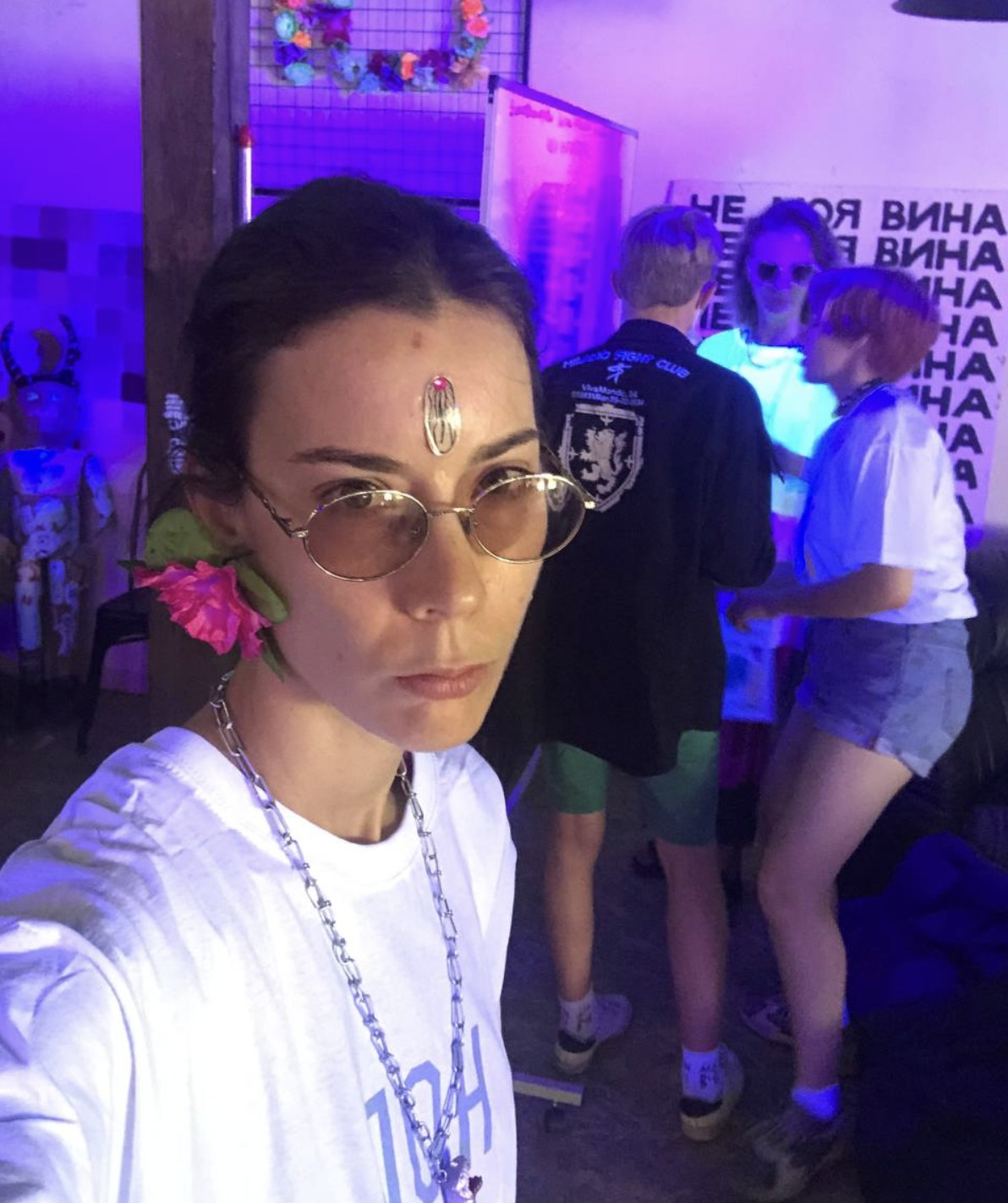
Maria Pronina, Davyd and participants of the "Os," a cluster for teenagers, opened on the basis of "TU" in 2021
M: There's a huge difference between those who got on the buses organised by collaborators and those who travelled on their own. The collaborator buses were directed in advance to various regions of russia — they were very quickly processed. But those who reached the border on their own in an attempt to leave the war zone — were the ones who were kept in filtration camps for several weeks in very harsh conditions: in gyms, schools, sleeping on old rags. We were helping a family and couldn't get them out for over a month because they couldn't pass through filtration in the Donetsk region.
D.: I’d understood that if I went on my own, I would be detained, so I got on the bus. Then we were brought to customs, where we waited all day to be taken to Bryansk. While we were waiting there, I’d overhear things like: "Oh! Azov will surrender soon!", "You saw, they have no weapons at all," and "Forward, Russia!"
How many months did you spend in the orphanage? How were your studies organised there?
D.: Eight months: from the beginning of April until the end of November – actually, almost nine. I’d entered the music college in Mariupol before the full-scale invasion began, so I really begged them to let me finish my first year. But they wouldn't, saying, "You've wasted a lot of time due to unplanned events". I attended all the classes in the college online but as a non-resident student, so I kind of finished the first year but not officially. The guys at the orphanage wanted to reinstate my Ukrainian school certificate and I tried my best to prevent it [because it would facilitate his integration into the russian education system]. When they failed to restore it, they sent me to a russian school instead, where I had to get their certificate. They kept saying to me: “Oh! You’re not doing anything at all, you’re so stupid!”
"You should read russian literature so that when you enter music college here, you'll be able to write musical transcriptions based on russian compositions" as if I'd be interested in listening to russian composers.
There are fifteen-year-olds in ninth grade and I'm seventeen. It was very difficult for me: everyone started noticing that I was gay. One fifteen-year-old boy said that he would beat me up, so I said: "Well, try it!” Another said, "'Look, recently Kherson became a part of russia. Are you happy?" I replied that I was Ukrainian and that if all this hadn't happened, I wouldn't be in russia at all. "So, does it seem okay to you that a person was forcibly deported?" After that, they began to tell the teachers about my position. There was a teacher there who was very fond of russian literature and so-called "unity" lessons [part of the “patriotic” curriculum], where they teach pupils that Mariupol, Kherson, and Zaporizhzhya were originally russian lands. This was such wholesale propaganda that I was even surprised. Have they ever heard about the history of Zaporizhian Sich[3]? I also understood that their memory is like that of a fish: they don’t remember what they were told yesterday. Sometimes I was even interested to listen to all this as if I was doing research (laughs).

David at the DJ console. Photo: Instagram
Was it possible not to attend classes at russian school?
D.: No, it wasn't but I skipped classes anyway. I wrote to M. hysterically, "That's it! I want to tell them that I won't go to school anymore!" and M. replied: "Calm down, you need to keep attending a little longer". I hadn't done my homework in the last few weeks. Why should I learn the geography of russia if it's about to disintegrate any day now?
Was the school separate from the orphanage?
D: Yes, I went to a normal public school, then I went back to the orphanage — where I lived, ate, slept, and stuff like that. I wasn’t allowed to take a walk or go anywhere, I was confined within four walls. Whenever I recall this image now, I feel sick.
What, from that period, is most strongly etched in your memory?
D.: At first, people there took me for a pacifist but when I started expressing a pro-Ukrainian position, they started to confront me, trying to get me worked up. And it's hard to make me lose my temper in such conversations. There was also a lot of talk about how russia was at war not with Ukraine but with the rotten West.
Also, there was one woman I used to talk to a lot. We hit it off because she didn’t have an imperialist mindset, she was against the occupation, against the expansion of russia. She was the one and only person with whom I felt truly at ease. During her shifts, she’d reach out to me to come to see her, or I’d go to see her myself. She helped me with my draughtsmanship — it’s a subject I love. She was a decent adult with whom I could talk openly. We still keep in touch to this day.
Were there other teenagers from Ukraine at the school or in the orphanage? What was your interaction with them like?
D.: When I arrived, there were two girls there, both were pro-russian. There was also a guy from Donetsk who was pro-Ukrainian. He’d left his city to avoid being conscripted into the russian army (he turned 18 last year). He wanted to return to Ukraine, hopefully, he is here now. We used to talk to each other in Ukrainian secretly. It’s such a pleasure to speak Ukrainian in russia! (laughs).
How did you keep in touch with people who were in Ukraine while you were in the orphanage?
D.: I communicated with them on Telegram, and watched Ukrainian YouTube – thankfully they didn't take away our smartphones. At first, I didn't write to M. for a long time and I guess the longer I didn’t write to her the more ashamed I felt. Also, I was probably afraid to write to her from russia. I texted her in the summer for the first time. At first, M. told me that I should wait until I was of legal age but my friend A. told me that he’d managed to return to Ukraine and I realised that I could leave too — so I started fighting.
M: I woke up to 15 messages from David, some of them were in all caps. He had already fully mapped out his escape plan. I told him, "Whoa, whoa, whoa! Your case is different from A.'s, he hadn't been sent to an orphanage, that's a whole different story! Then David decided that he would work out his own plan.
D.: I tried to find out if it would be possible to cross the border with a notarial power of attorney signed by my mother. I was told that it would be and asked why I needed it. I answered that I was going back to Mariupol because they’d stopped shelling it (laughs). I also needed to find someone who would agree to issue a power of attorney in their name. And it was very important to persuade my mother to agree to sign this document. I talked to a friend of mine, who advised me to approach volunteers to help with all this.
Do you keep in touch with your mum?
D: Unfortunately, yes. Unfortunately, because I came out to her as gay and the reaction was, "What will the neighbours say?".
When we learned about your experience and your art, we were very intrigued. You’d recorded two albums after having been deported, while in a russian orphanage. Tell us more about those albums and the whole recording process.
D.: You have to listen to them! I didn't let anybody listen to them there, except that woman I mentioned.
I recorded the vocals mostly in the daytime when no one was around. At night I taught myself how to do the instrumentals. The tracks "Testament" and "Initial Attempt" were the beginning of my learning of the composition process. At that time I was exploring sound and how the brain works while listening to it. Now I can already work on the form – it’s been a real journey, which is cool! While I was recording the vocals, I felt like I wasn't doing enough but I made the album in nine days. The idea to write "Testament" came after one of those so-called patriotic education classes, where they were claiming that Kherson is russian. I thought, "Oh, you bitches!" and started writing the album. I understood that I wasn't going to be there forever, so I decided to write there and then.
It was a temporary shelter, from which children were later transferred to permanent orphanages. There were 6-12 children in the room with me, the beds were around 50cm-1m apart. That's why I value personal space so much now. To record vocals, I went to the dryer [room]. I had very bad headphones, so the quality isn’t great but it doesn’t matter. My friend said that the album was mastered in a punk way!
Did you support anyone during the time after your deportation? Were there people who needed your support?
D.: Yes, my best friend — we called each other all the time. He was 16 then, he had no hope left, it was very difficult for him. We supported each other.
Other teenagers were also writing to me: at first we were corresponding in Ukrainian, but later I saw the russian flag in their publications. After that, I never replied to them again.
M: Back when some of our teenagers were still in russia, we’d start an escape plan, it would fail, we’d start working on the next one, and so on, and so on — many times. Then we created a chat room specifically for deported teenagers — to communicate with them and offer them support. It was important to us that they understood that by being there (and preserving their identity), they were waging their own struggle. We wrote to them that they were like Taras Shevchenko in exile, engaged in their creative projects. There was one guy who edited, one girl who wrote, David made music, and we tried to find mentors who would support them from a distance. David was kind of the pinnacle of this project, because he recorded a track based on Taras Shevchenko's poem "Testament" ("Zapovit") (everyone laughs loudly). Now they've all gotten out of there and it's become an important experience for them.
There was such an attack by journalists, but we refused to speak with almost everyone.
D: The only people I gave interviews to were CNN but I didn't like it. It really annoys me that these materials portray me through the lens of pity rather than as a strong person. They talk about how everyone helped me but that's not true! I was motivated to leave, I found the volunteers myself, I took the first step myself. If I hadn’t taken that step, no one would have helped me. It pisses me off when Ukrainians are portrayed as weak, inert creatures. It’s very offensive.
I'm very grateful to all those who have helped and supported me but if I hadn't started this search for possibilities myself, nothing would have happened.
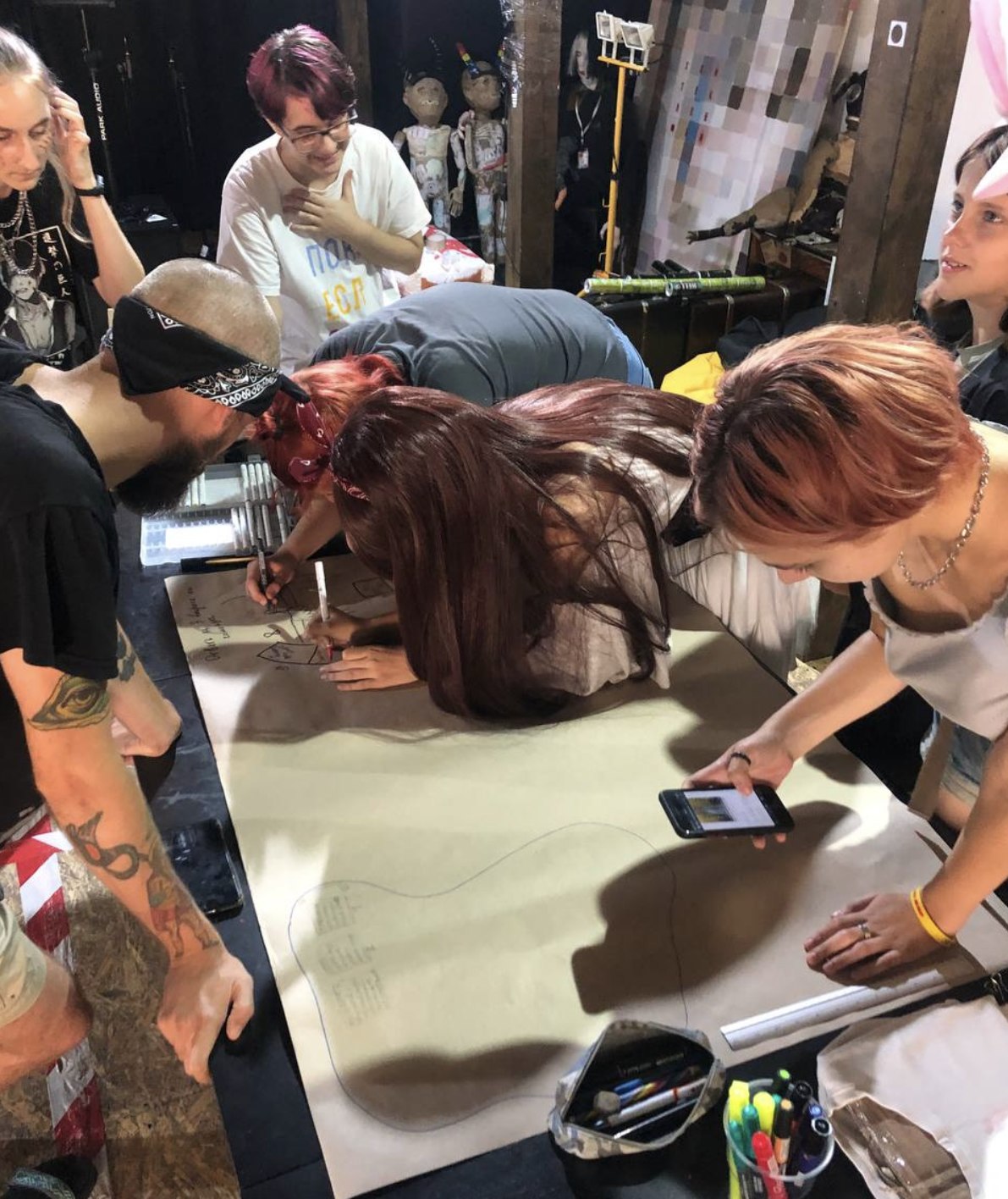
Meeting in the "Os" cluster, created for teenagers on the basis of "TU" in 2021
How do you remember Mariupol and your life there, what forms of connection do you maintain with the city now?
D.: In my memories, the city is ambiguous because, on the one hand, I had problems there as a member of the LGBT+ community and, on the other hand, there was TU and it was the only place where I felt completely free. I feel warmth remembering TU, the music college, my family, my history, smiles, and my last moments in Mariupol when I wasn't yet thinking about danger. Although there was always some danger for me there — there was “Tradition and Order”[4] [an extremist far-right group] and they used to chase me to beat me up.
M: It's true, we even witnessed it once. But David was very brave dealing with them, which I really respect him for. Even when a number of guys – really big guys – came to him and started to bully him [for not behaving “traditionally”] in Mariupol, he’d straighten up and say: "Yes, that's me! What are you going to do about it? Beat me? — Well, try it! But I am who I am and I won't stop being me”. I believe that this experience of confronting right-wing radical pricks helped David to remain himself in russia.
D: I only realised who I was when I was seventeen, before that I was searching for myself and still am, in fact, searching. And I am grateful to Mariupol for this experience, both bright and dark. I miss the city. "Meet at [the] Drama [Theater]" — the city of encounter can't be changed.
M: The teens who came to our art cluster formed a very supportive community. They were able to talk freely, understand who needed what, stand up for their values together, make friends, and feel less lonely. Thus, they became stronger.
D.: “TU” has been very inspiring for me and helped me to find my own attitude. Before that I didn’t think I could be free, I was depreciating myself. But then I came to TU and I realised that I shouldn't limit myself.
I’m really grateful to TU for this experience! Thanks to it, later – during the war and my time in russia – I was able to understand myself better.
How strongly did you feel the presence of “Tradition and Order” in Mariupol?
D.: A f*ckload!
M: You had the perspective of a teenager, to whom “Tradition and Order” could pose a real threat. And I’m one of the adults who they’d recognise in the street but were afraid to approach because I might knock the hell out of them. There were several times when I’d be walking down the street and some guys from “Tradition” would come towards me, look at me, and I’d look into their eyes… and we'd just… pass each other by (both laugh). And just once, they covered the whole façade of the TU building with homophobic stickers. And it was done really fast, while we were running a workshop on feminist writing inside. How did they manage to do it so quickly? It's because they knew we could kick their homophobic asses. We went out and wrote over them all.
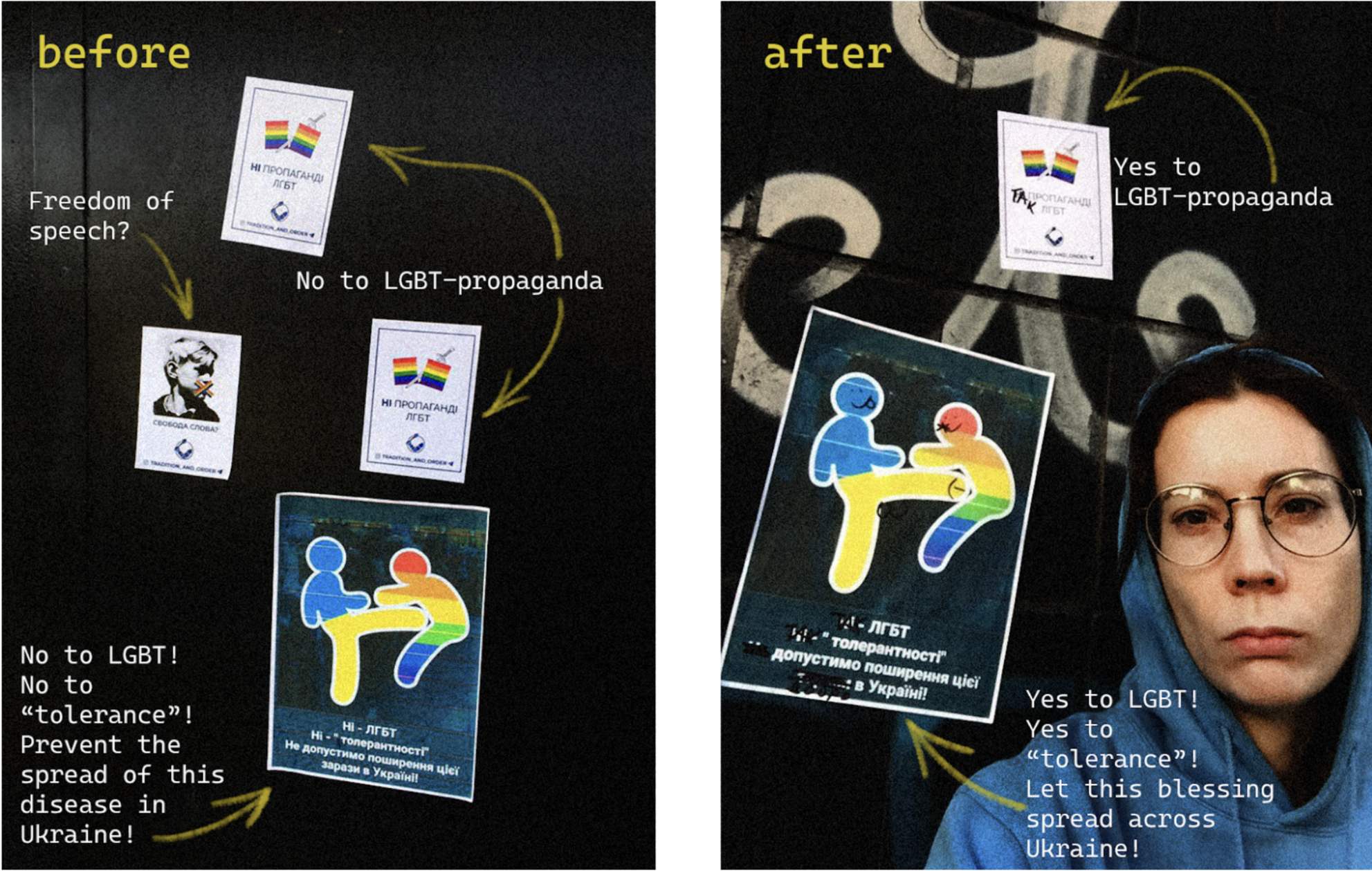
Collage by ZGRAYA, photos by Maria Pronina
“Tradition and Order” recruited teenagers who were able to "solve" problems with teenagers like themselves. With the likes of us, they couldn’t fight, not really. There were a lot of openly LGBT persons among the organisers of TU, as well as people who collaborated with human rights organisations. Also, in Mariupol the patrol police and its chief were super cool: they guarded the LGBT movie screenings — you’d come to see some queer movie and there’d be eight cop cars to protect you.
There's only been one attack on TU, sometime in 2016-17. There was a teenage punk band concert that day and most of the organisers weren't in the building. A bunch of huge dudes in balaclavas broke into the venue, threw smoke bombs, smashed the floor with guitars, broke the musicians' legs and ribs — something like that…
What advice would you give to teenagers who are still in russia after having been deported there?
D.: First, the fact that you are reading this means that you want to make a difference. Second, you are great if you are reading this and trying to get out of russia. If you do not have people who can help you, look for volunteers, look for people you know who have left, and ask them how they managed it. Third, never tell the orphanage staff where you want to go, better to say: "I'm going back home". Fourth, look for an adult with whom you can make a power of attorney.
Try to communicate with your loved ones as much as possible and detach yourself as much as you can from what is going on over there. If you are creative, try to make something to be remembered for in Ukraine.
M.: And if you are an average guy?
D: These days there are no Ukrainians who are just average guys, everyone helps somebody. So help. If your friends also want to leave the country — communicate, and share your contacts (but carefully!!!). And delete correspondence, provocative photos, etc.
And when you return to Ukraine, be prepared to be thoroughly searched. You should understand that you are returning from russia, so you may be checked and searched closely. It’s better not to hide anything, because it will be revealed anyway — you’re returning home, you have nothing to hide. The communication at Ukrainian customs can be aggressive – not always – but that's how it was for me: everyone’s on edge. If the border guards make jokes — adjust to their sense of humour.
One last very important tip on how to communicate with pro-russian parents. You need to tell them stories that might convince them in your particular case to help you leave. You also need them to see that you have the support of other adults (volunteers, teachers, and so on). They need to see that their children are being "pulled along" by adults who give an impression of authority.
Footnotes
- ^ * by deciding not to capitalise the noun "russia", as well as adjectives and proper names derived from it, the authors and editors of this text express their support for the people of Ukraine
- ^ Tsvirin is a self-organized association comprising educators, philosophers, and artists who combat russian propaganda. Through activist pedagogy, Tsvirin explores volunteerism within the russian federation, examining it from a pro-Ukrainian and decolonial perspective. The participants of Tsvirin oppose the deportation of Ukrainian citizens, actively engaging in volunteering efforts to help them leave the russian federation, while also spreading information on integrating deported minors and strategies to prevent such situations.
- ^ The Zaporozhian Sich was a semi-autonomous polity and proto-state of Cossacks, which existed between the 16th to 18th centuries within the Ukrainian Hetmanate. Zaporozhian Sich is an example of an early formation of Ukrainian democratic nationhood, where rulers (military commanders, such as Hetmans and Kish Otaman) were elected.
- ^ “Tradition and Order” is a Ukrainian far-right group, registered in Ukraine as a non-governmental organisation. The organisation articulates its goal of building a strong and independent state based on traditionalism, conservatism, patriotism, a protectionist economy and Christian values. The party is known for its campaigns to preserve the patriarchal family and for its opposition to feminist and LGBT causes. According to Vyacheslav Likhachev (a researcher of the Ukrainian far-right) and Freedom House, “Tradition and Order” has the characteristics of an extremist organisation.
Conversation: collective TSVIRIN
Cover: Kateryna Gritseva
Support “Ptichka” foundation by subscribing on Patreon (click on the picture):
